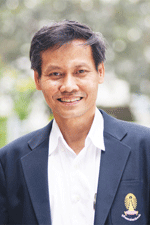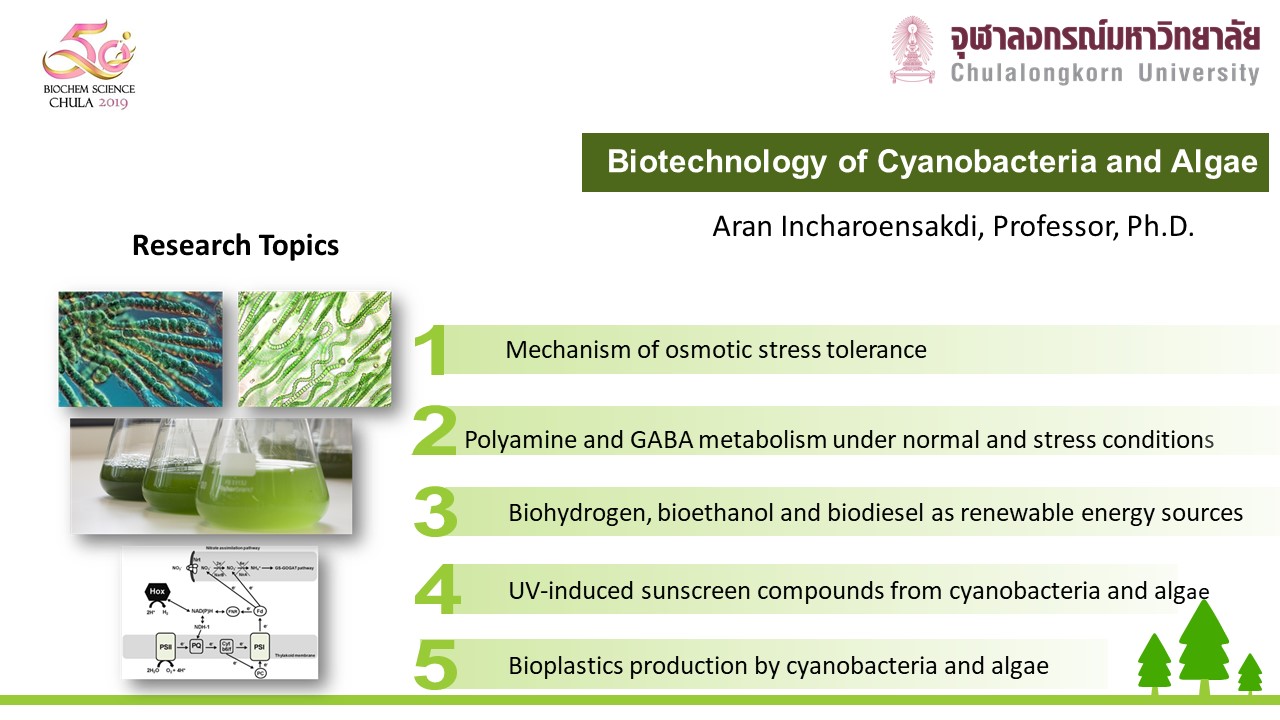
Aran Incharoensakdi, Professor, Ph.D.
B.Sc., Victoria University of Wellington
M.Sc., Mahidol University
Ph.D., Nagoya University
Office: Room 511, Science 10 Building
Phone: 662-218-5422
Fax: 662-218-5418
Email: aran.i@chula.ac.th
Research

- Mechanism of salinity tolerance in cyanobacteria
- Biochemical responses to osmotic stress in cyanobacteria
- Signal transduction in cyanobacteria under environmental stress
- Polyamines metabolism in cyanobacteria
- Amino acids transport in cyanobacteria
- Biotechnology utilizing cyanobacteria as starting materials
- Biohydrogen as alternative biofuels
- Bioethanol and biodiesel production
- UV-protective compounds for use as UV-sunscreen
- GABA production
- Bioplastic production to replace petroleum-based plastic
The main research area in Laboratory of Cyanobacterial Biotechnology is listed as described above. We have been studying the mechanism of salinity tolerance in cyanobacteria. In particular we are interested in proteins and/or genes that can confer salt tolerance in cyanobacteria. We have also studied the effect of salt stress on changes of polyamines as well as changes in nitrogen metabolism in cyanobacteria. We also initiated another line of study on signal transduction using cyanobacteria as a model system, i.e. the mechanism(s) involved in phosphate-sensing system.
Recently, we have studied biohydrogen production from different cyanobacteria and green algae. We also tried to genetically engineer the cells to maximize hydrogen production. Production of other renewable energy sources, namely bioethanol and biodiesel is also being investigated. During the past few years we have been working on the induction of UV-absorbing compounds by UV radiation as well as the production of GABA and bioplastic (PHB). Most of the research funding for our group is provided by the Thailand Research Fund, Chulalongkorn University, and the Commission of Higher Education. At present, Dr. Aran is serving on editorial board of BMC Microbiology as well as Frontiers in
Recent Publications
Publications
- Velmurugan R, Kanwal S, *Incharoensakdi A (2022) Non-ionic surfactant integrated extraction of exopolysaccharides from engineered Synechocystis sp. PCC 6803 under fed-batch mode facilitates the sugar-rich syrup production for ethanol fermentation. Algal Res. 66: 102772. [IF 5.276]
- Wutthithien P, *Incharoensakdi A (2022) Improved biohydrogen production by co-cultivation of N2-fixing cyanobacterium Fischerella muscicola TISTR 8215 and microalga Chlorella sp. Appl. Phycol. 34: 1921-1930. [IF 3.404]
- Ramprakash B, *Incharoensakdi A (2022) Alginate encapsulated nano-bio hybrid system enables improvement of photocatalytic biohydrogen production in the presence of oxygen. J. Hydrogen Energy 47: 11492-11499. [IF 7.139]
- Sivaramakrishnan R, *Incharoensakdi A (2022) Overexpression of fatty acid synthesis genes in Synechocystis sp. PCC 6803 with disrupted glycogen synthesis increases lipid production with further enhancement under copper induced oxidative stress. Chemosphere 291: 132755132755. [IF 8.943]
- Ramprakash B, *Incharoensakdi A (2022) Dark fermentative hydrogen production from pretreated garden wastes by Escherichia coli. Fuel 310: 122217. [IF 8.035]
- Velmurugan R, *Incharoensakdi A (2021) Overexpression of glucose-6-phosphate isomerase in Synechocystis sp. PCC 6803 with disrupted glycogen synthesis pathway improves exopolysaccharides synthesis. Algal Res. 57: 102357. [IF 5.276]
- Sivaramakrishnan R, *Incharoensakdi A (2021) Higher efficiency of microalgal biorefinery is achieved with integrated than one-way method. Fuel 300: 120988. [IF 8.035]
- Sivaramakrishnan R, Ramprakash B, Ramadoss G, Suresh S, Pugazhendhi A, *Incharoensakdi A (2021) High potential of Rhizopus treated rice bran waste for the nutrient-free anaerobic fermentative biohydrogen production. Bioresour. Technol. 319: 124193. [IF 11.889]
- Ramprakash B, *Incharoensakdi A (2020) Encapsulated titanium dioxide nanoparticle-Escherichia coli hybrid system improves light driven hydrogen production under aerobic condition. Bioresour. Technol. 318: 124057. [IF 11.889]
- Sivaramakrishnan R, Suresh S, Pugazhendhi A, Pauline J M N, *Incharoensakdi A (2020) Response of Scenedesmus sp. to microwave treatment: Enhancement of lipid, exopolysaccharide and biomass production. Bioresour. Technol. 312: 123562. [IF 11.889]
- Sukrachan T, *Incharoensakdi A (2020) Enhanced hydrogen production by Nostoc sp. CU2561 immobilized in a novel agar bead. J. Appl. Phycol. 32: 1103-1115. [IF 3.404]
- Khetkorn W, Lindblad P, *Incharoensakdi A (2020) Enhanced H2 production with efficient N2 -fixation by fructose mixotrophically grown Anabaena sp. PCC 7120 strain disrupted in uptake hydrogenase. Algal Res. 47: 101823. [IF 5.276]
- Ramprakash B. *Incharoensakdi A (2020) light-driven biological hydrogen production by Escherichia coli mediated by TiO2 Int. J. Hydrogen Energy 45: 6254-6261. [IF 7.139]
- Velmurugan R, *Incharoensakdi A (2020) Heterologous expression of ethanol synthesis pathway in glycogen deficient Synechococcus elongatus PCC 7942 resulted in enhanced production of ethanol and exopolysaccharides. Front. Plant Sci. 11: 74. [IF 6.627]
- Sivaramakrishnan R, *Incharoensakdi A (2020) Plant hormone induced enrichment of Chlorella sp. omega fatty acids. Biotechnol. Biofuels 13: 7. [IF 7.670]
- Velmurugan R, *Incharoensakdi A (2020) Co-cultivation of two engineered strains of Synechocystis sp. PCC 6803 results in improved bioethanol production. Renew. Energy 146: 1124-1133. [IF 8.634]
- Kanwal S, *Incharoensakdi A (2020) GABA synthesis mediated by γ-aminobutanal dehydrogenase in Synechocystis sp. PCC 6803 with disrupted glutamate and a-ketoglutarate decarboxylase genes. Plant Sci. 290: 110287. [IF 5.363]
Review Articles
- Ramprakash B, Lindblad P, Eaton-Rye JJ, *Incharoensakdi A (2022) Current strategies and future perspectives in biological hydrogen production: A review. Renew. Sust. Energy Rev. 168: 112773. [IF 1799]
- Velmurugan R, *Incharoensakdi A (2022) Metabolic transformation of cyanobacteria for biofuel production. Chemosphere 299: 134342. [IF 8.943]
- Sivaramakrishnan R, Suresh S, Kanwal S, Ramadoss G, Ramprakash B, *Incharoensakdi A (2022) Microalgal biorefinery concepts developments for the biofuel and bioproducts; current perspective and bottlenecks. Int. J. Mol. Sci. 23: 2623. [IF 6.208]
- Rastogi R P, Madamwar D, Nakamoto H, *Incharoensakdi A (2020) Resilience and self-regulation process of microalgae under UV radiation stress. J. Photochem. Photobiol. C: Photochem. Rev. 43: 100322. [IF 17.176]
Book Chapters
- Sivaramakrishnan R, *Incharoensakdi A (2021) “Cyanobacteria as renewable source of bio-energy (bio-hydrogen, bio-ethanol and bio-oil production)” in “Ecophysiology and Biochemistry of Cyanobacteria”, pp. 431-454, Rastogi RP (ed.) Springer, Singapore.
- Sivaramakrishnan R, *Incharoensakdi A (2021) “Microalgal biodiesel production” in “Biodiesel Fuels Based on Edible and Non-edible Feedstocks, Wastes, and Algae: Science, Technology, Health, and Environment” (Vol. 2)”, pp. 803-817, Konur O (ed.), CRC Press, Boca Raton, Florida, USA.

